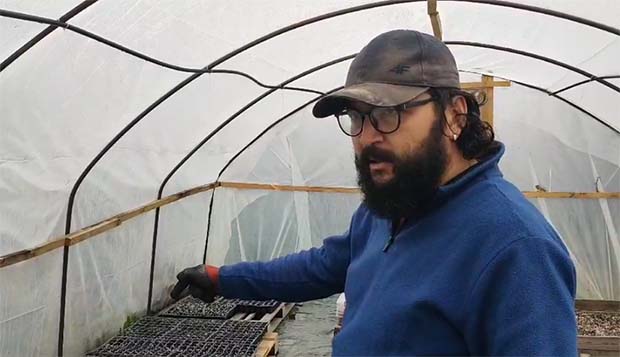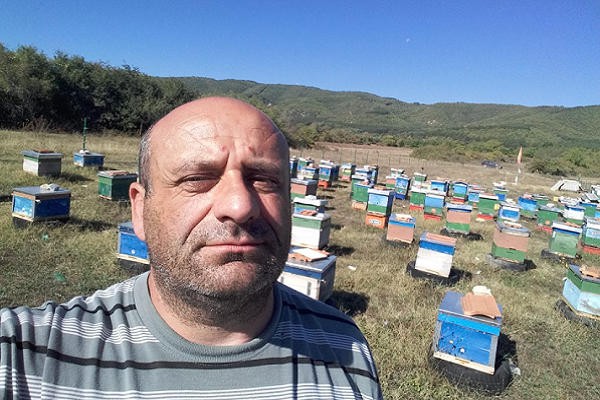Organic Production in the Ohrid Region in Its Infancy
Only two farmers in Ohrid are certified for organic production, and no beekeeper from this region meets the requirements. The uncontrolled use of pesticides in June this year caused a large plague of bees in the villages of Ohrid. There is a lack of education and application of the laws. The European Commission notes little progress in the area of rural development
Author: Sonja Rilkovska
Only two farmers in the Ohrid region have a certificate for organic production. One of them is Akin Sezer, a farmer from Turkey, who has lived in Ohrid for ten years.
He has received a certificate and is in the initial stage of adaptation to organic farming. In the garden in “Andon Dukov” he plants organic seedlings with seeds brought from Turkey. He successfully produces thousands of roots of artichoke, asparagus, eggplant, peppers, strawberries and other vegetables and fruits. He says that he does not use pesticides and that there is only organic products in his fertile garden.
I immediately started the process for organic products and we already have certification in the first phase. Now we have two years, the organic production should be maintained according to the prescribed protocols. Customers want to buy organic products, and they want healthy food without pesticides. We have a ranking, we have interested buyers who want to use organic food in Ohrid, Sezer told Truthmeter.
Adapting to organic production is a very long and expensive process, and farmers fail to use funds from IPARD programs because, as they say, they are quite complicated.
I have not applied for IPARD, those programs are complicated for me. You are required to invest from your own pocket, and then after a certain period you are waiting to receive a refund, and it is not certain when and if you will receive them, adds Sezer.

Photo: Truthmeter
THERE IS NO BEEKEEPER FROM THE OHRID REGION, WHO PRODUCES ORGANIC HONEY
No beekeeper from the Ohrid region produces organic honey. Out of a total of 65 registered beekeepers in the “Beekeeping Association Ohrid”, none has a certificate for organic production. They say they want to, but a lot of money is needed to re-adapt the production.
There are two agencies in the country that approve organic honey production and beekeeping. The procedures are complicated. There is no organic sugar, no organic food, no one produces them. All the equipment should be changed, which is a really big investment. There is a period for adaptation of several years, but the investment is big for the budget of the beekeepers, says Toni Josifoski, president of the “Beekeepers Association Ohrid”.
Although there are many unused funds in the IPARD programs for support of agriculture and rural development, the beekeepers say that they do not know how to use them, and most of them do not even meet the requirements.
I have not met a beekeeper who can meet all the conditions in the IPARD programs. The national support program, which was limited to 1,500 Euros, could be used for small investments and support for agriculture. IPARD programs are too complicated, adds Josifoski.

Photo: FB profile
UNCONTROLLED USE OF PESTICIDES CAUSES LARGE PLAGUE OF BEES IN OHRID REGION
The beekeepers from Ohrid in June this year faced a great plague of bees, which were poisoned due to careless spraying of fruit with pesticides.
Damage to the beehives was noticed by beekeepers from several villages, Orman, Kosel, Livoišta, Vapila, Leskoec, Velgošti, Orovnik, Podmolje, Mešeišta, Dolno and Gorno Lakocerej, and Trebenishta. The bee families that were most developed in June with this plague were halved.
The orchards inadvertently caused us enormous damage in June. The bees that came out to feed were destroyed on several occasions. We strive for healthy food, organic production, but unfortunately strong pesticides are used that completely destroy the beehives and that will affect the production of honey, says Josifoski.
The uncontrolled use of various types of pesticides, which every farmer buys on their own, must stop.
This uncontrolled use of pesticides by fruit growers and farmers must stop. It is not known who uses what pesticides and to what extent. There must be greater control by the inspection services, says Josifoski.
The application of pesticides is not at an appropriate level in terms of expertise. This is due to the low level of conscience, legal regulations and their implementation, said Miroslav Trajcevski, an agronomist from Ohrid in June for TVM.
There is a lack of joint communication between all the factors involved in this problem, there is a lack of education, there is a need for better application of the laws. Education trainings should be organized, at least in the period of fruit flowering, to educate farmers about the benefits and harms of the preparations, otherwise nowadays large-scale industrial production of food without the use of pesticides is not possible. They are a necessary evil. But the bees must be protected, the instructions for use of pesticides must be read and respected, which can reduce this problem to a minimum, said Trajceski.
EUROPEAN COMMISSION NOTES LITTLE PROGRESS IN THE LATEST REPORT
The national rural development policy needs to be harmonized with EU law. In terms of the quality policy, the implementation of quality schemes has been slow because administrative capacity remains insufficient despite the sectoral potential for traditional products and designations of origin, according to the EC Report.
Regarding organic agriculture, the legislation, the competent authority, the control bodies and the accreditation and certification system are established and functional. Monitoring and control of certification of organic production and products should be carried out more systematically. There is potential for further development of the sector and for full utilization of the opportunities within the IPARD III Program, the Report notes.
The report says some progress has been made in complying with EU rules on the Common Market Regulation (CAP) through the preparation of commodity-specific regimes for wine and honey, fruit and vegetables. Progress has also been made in the use of IPARD programs.
In the area of rural development, good progress has been made in the absorption of EU funds under the Instrument for Pre-Accession Assistance for Rural Development (IPARD II). By the end of 2020, payments to recipients exceeded 4 million euros. However, it is essential to increase the number of employees in the Agency for Financial Support in Agriculture and Rural Development. Preparations for the IPARD III Program are progressing, the EC Report notes.
![]() This article has been produced within the project Fact-Checking the Progress of North Macedonia towards the EU, implemented by the Metamorphosis Foundation. The article, originally published by Truthmeter,, is made possible by the support of the American non-profit foundation NED (National Endowment for Democracy). The content of this article is the responsibility of the author and does not necessarily reflect the views of Metamorphosis, NED or their partners.
This article has been produced within the project Fact-Checking the Progress of North Macedonia towards the EU, implemented by the Metamorphosis Foundation. The article, originally published by Truthmeter,, is made possible by the support of the American non-profit foundation NED (National Endowment for Democracy). The content of this article is the responsibility of the author and does not necessarily reflect the views of Metamorphosis, NED or their partners.
All comments and remarks regarding this and other Vistinomer articles, correction and clarification requests as well as suggestions for fact-checking politicians’ statements and political parties’ promises can be submitted by using this form

